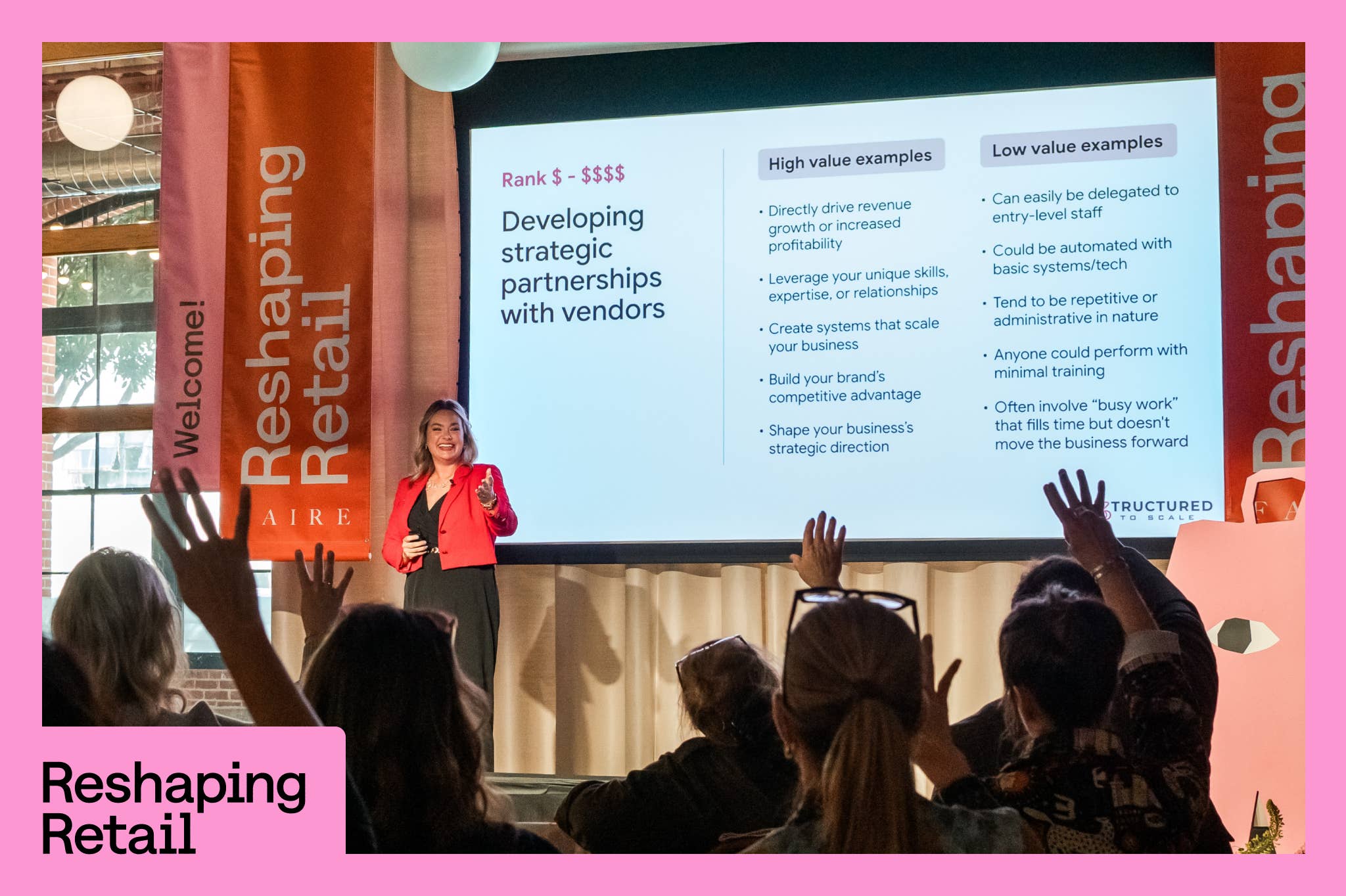
With the ever-evolving nature of the retail landscape, successful retailers are working smarter and adapting their routines to be more efficient, and being efficient requires good time management for store owners. At Faire’s recent learning event, Reshaping Retail, Structured to Scale CEO Colleen Carswell explained her five principles of time economics with time-saving retail tools to help you better measure and manage your time. We’ve got the recap below.
The 5 principles of time economics
As a seasoned business strategist, integrator, and speaker with more than 17 years in hospitality and corporate sales, Colleen Carswell knows a thing or two about the true cost of your time as a business owner. Her five principles of time economics are designed to help you determine high- and low-value retail activities and manage your time more efficiently.
Principle 1: You can’t manage what you don’t measure
Knowing where your time is going is the first step to better retailer productivity. It might seem like you don’t have time to implement a tracking system, categorize your time, budget your hours, and measure your ROI in relation to time management. But according to Colleen, you should think of time audits as a necessity like bookkeeping and accounting.
Principle 2: Value-based allocation
Once you know where your time is going, you can reallocate it based on value. High-value activities directly drive revenue, leverage your unique skills or relationships, are scaled to your business, make your brand more competitive, and shape your strategic direction. Low-value tasks are repetitive and could be easily automated or delegated to entry-level staff with minimal training. These tasks will be different for every business owner, though, so it’s important to be specific when assessing and allocating your time.
Principle 3: Time energetics
According to this principle, time isn’t just objective—it’s deeply subjective and connected to your energy state. With things we enjoy doing, time often feels like it’s rushing by, but with things we hate doing, time often feels like it’s dragging on. Different people enjoy different things, though, and there’s a good chance someone on your team likes doing something you hate. Colleen uses the example of laundry—many people hate doing it, but some people enjoy it. Think about this principle when building out your team.
Principle 4: Implement ROI-based thinking
You have to invest time to make time, according to this principle. Just like you have to spend money to make money, Colleen explains how you have to use extra time now to make more free time available in the future. By spending a couple of weeks tracking your time in 15-minute increments, you’ll be able to save more time in the future.
Principle 5: Delegation and automation
In your financial life, you use tools like loans and credit to create leverage, but in your time life, delegation and automation create leverage. When auditing your time, consider whether you can delegate, eliminate, or automate any of your regular activities. Just like tapping into loans and credit to increase cash flow, you can tap into time tools that automate or streamline your order building, buying, and point-of-sale processes.
Tune in to the video for a list of tools Colleen recommends to manage your time.
Faire’s tools can help you create more time
Faire also offers tools to save time and increase automation for small business owners like you, starting with the Faire app that you can easily access from your phone, tablet, or laptop. Faire for teams also helps retailers efficiently share responsibilities with team members or partners, while maintaining visibility into everything the team is doing on Faire. And our POS integrations make it easy to streamline your inventory management processes by providing timely, accurate data automatically without any manual data entry required.
Watch the full playlist of all sessions and subscribe to the Faire YouTube channel.
About the speaker

Colleen Carswell is a strategic business integrator and time management expert with more than 17 years of leadership experience across hospitality, customer service, and corporate sales. Beginning her career as an onboard wedding coordinator for Royal Caribbean, Colleen developed a unique approach to time management that she now calls “Time Economics.” A recognized industry voice, Colleen’s work has appeared in publications including Forbes, Success, Travel and Leisure, and USA Today. Through Structured to Scale, Colleen empowers business owners to invest their time strategically, eliminate “profit-eating” inefficiencies, and reignite their passion while achieving sustainable growth.

